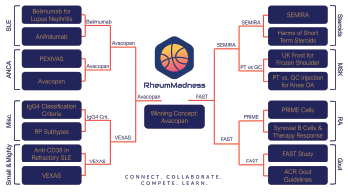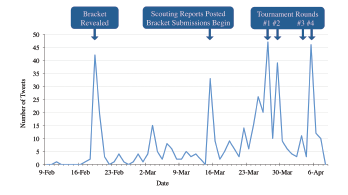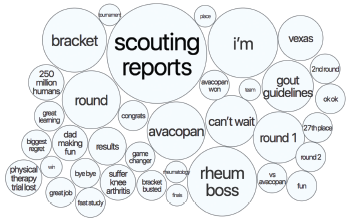
Tasha Art; PureSolution / shutterstock.com
RheumMadness is an online collaborative learning experience created to educate trainees, rheumatologists and the wider medical community about recent advances and important concepts in rheumatology. The project is funded by the Rheumatology Research Foundation Clinician Scholar Educator (CSE) Award and modeled after NephMadness, an educational initiative of the American Journal of Kidney Diseases (AJKD) that has engaged over a thousand nephrologists from all over the world.1-3
After a successful first year of RheumMadness, we are on course to create similar engagement in the rheumatology community, and we are thrilled to share our early experiences with this fun and educational activity.
In RheumMadness, rheumatology concepts are entered as teams to compete in a single-elimination tournament, much like basketball teams in the U.S. National Collegiate Athletic Association (NCAA) compete in the March Madness tournament. The 16 teams in the 2021 RheumMadness bracket are recently published studies, such as avacopan for anti-neutrophil cytoplasmic antibody (ANCA) associated vasculitis and pre-inflammatory mesenchymal (PRIME) cells in rheumatoid arthritis (see Figure 1). Participants submit their own bracket, in which they try to predict the winners of each match-up. The winners are then chosen by a Blue Ribbon Panel of rheumatology content experts.
Throughout this process, participants are invited to engage with a variety of social and educational elements designed to enable everyone who is crazy about rheumatology to connect, collaborate, compete and learn together.
Connect

Figure 1: The 2021 RheumMadness Bracket
RheumMadness is grounded in social constructivist learning theory, which proposes that deep and meaningful learning occurs when people build knowledge together through discussion, debate, shared experiences and other forms of social interaction.4 We all intuitively understand the value of social constructivism; it is the reason we have book clubs, interest groups and case-based discussions. Yet often, when we need to learn something new in medicine, we attend non-interactive lectures or scroll abstracts on PubMed alone. Even interactive journal clubs at our own practices are limited by traditions and local pockets of expertise (or lack thereof), and we could all benefit from an increased diversity of perspectives on rheumatology topics.
With this in mind, RheumMadness is designed to build a community of learners online. Twitter is a lively forum for RheumMadness participants, with a total of 486 tweets from 105 users using the hashtag #RheumMadness during the 2021 tournament (see Figure 2). The impact of these tweets can be estimated by measuring

Figure 2: Tweet About It
This figure shows the number of tweets per day using the hashtag #RheumMadness during the 2021 tournament. Data from Symplur.
impressions, or the number of times a tweet about #RheumMadness appears in any Twitter user’s feed. In 2021, RheumMadness led to 2,312,386 potential Twitter impressions (data from Symplur, 2/8/21–4/8/21).
What do RheumMadness participants tweet about? Participants share their perspectives on concepts in the tournament, joke and connect with each other, rejoice when their bracket performs well, and commiserate when their bracket performs poorly.
Particularly memorable moments from the 2021 tournament included rheumatology participants educating a nephrologist about the importance of the newly identified and described VEXAS syndrome, authors of studies included in the tournament chiming in with their own insights, and a Twitter poll created by a participant asking rheumatologists if the black box warning for febuxostat should be modified or removed based on the findings of the Febuxostat versus Allopurinol Streamlined Trial (FAST). A word cloud of trending terms from Twitter conversations during the tournament provides a glimpse into the social interactions in RheumMadness (see Figure 3).

Figure 3: Trending Terms
This word cloud illustrates the terms that trended on Twitter during the RheumMadness 2021 tournament, excluding tweets from @DavidLeverenz (tournament organizer) and all retweets. Data from Symplur.
We also created a private RheumMadness Facebook group just for rheumatology trainees, hypothesizing that trainees might feel more comfortable sharing their thoughts and opinions with peers in a private space, rather than broadly on Twitter. Although we did garner 81 members in the Facebook group, there was surprisingly little interaction on Facebook compared with Twitter. Therefore, moving forward, Twitter will continue to serve as the main social space for connection in RheumMadness.
With the knowledge that podcasts help foster a sense of connection in professional communities, we created a RheumMadness podcast series, hosted by the RheumMadness Leadership Team, all of whom are authors of this article.5 The composition of this team is intended to reflect the target audience for RheumMadness, ranging from fully trained rheumatologists to those aspiring to become rheumatologists.
Listeners are invited to journey with us through each stage of RheumMadness. In our first episodes, we discussed teams that could be included in the bracket to familiarize listeners with the concept of rheumatology topics playing as teams in the tournament while also providing direct teaching about the topics.
After announcing the 2021 bracket of teams, we recorded two bracketology episodes, discussing how each team might do in the tournament, thus providing context for the type of conversation we hoped RheumMadness might foster online.
In our final two episodes, we reflected on the results of the tournament and thanked everyone involved. In total, we recorded 15 podcast episodes from August 2020 through April 2021, generating more than 2,300 total downloads, an average of 153 downloads per episode.
Collaborate
As a social constructivist learning activity, RheumMadness does not just seek to foster a community of learners, but also to stimulate collaborative knowledge creation within the community. Instead of asking participants to learn a predefined set of information, we provided a scaffold on which they could build the knowledge themselves.6 In RheumMadness, this scaffold was the bracket of teams included in the tournament.
The teams in the 2021 tournament were chosen by the RheumMadness Leadership Team with the intention of including rheumatology concepts that were novel, important, intriguing and would match up well with other concepts in the tournament. We also intentionally chose topics from diverse publication types in rheumatology, including clinical trials, translational studies, classification criteria and management guidelines.
The collaborative learning built on this scaffold began with scouting reports, reviewing each team in the tournament. These were collaboratively written by more than 40 fellows from 14 different adult rheumatology fellowship programs across the U.S. (see Table 1). We undertook extensive efforts to clearly and concisely explain the concept of RheumMadness and expectations for these reports via instructional videos, an example scouting report written by the RheumMadness Leadership Team and a blank template for generating scouting reports.
Table 1: Key RheumMadness Collaborators: adult rheumatology fellowship programs involved in scouting report creation and Blue Ribbon Panel members
| Fellowship Programs Involved in Scouting Report Creation |
|---|
| Allegheny Health Network |
| Duke University School of Medicine |
| Loma Linda University Health |
| Massachusetts General Hospital |
| Medical College of Wisconsin |
| Medical University of South Carolina |
| Northwestern University Feinberg School of Medicine |
| Ocshner Medical Center |
| University of Chicago |
| University of Colorado School of Medicine |
| University of Kentucky College of Medicine |
| University of North Carolina School of Medicine |
| Vanderbilt University School of Medicine |
| Wake Forest School of Medicine |
| Blue Ribbon Panel Members |
| Beth Jonas, MD, FACR, University of North Carolina |
| Eli Miloslavsky, MD, Massachusetts General Hospital |
| Jeffrey Sparks, MD, MMSc, Brigham and Women’s Hospital |
| Kristen Young, DO, UT Southwestern |
| Michael Putman, MD, MSCI, Medical College of Wisconsin |
| Tayseer Haroun, MD, Northern Virginia Center for Arthritis |
| Teresa Tarrant, MD, Duke University |
Five programs also participated in an hour-long bracketology session to help them plan their scouting report during the virtual Winter Carolinas Fellows Collaborative meeting in February 2021.
The scouting reports are the principle learning vehicles and the educational anchors of the RheumMadness tournament. They can be found on the RheumMadness website for any interested reader.7 The reports all follow the same basic structure:
- A brief overview of each topic;
- Current and potential future implications for patients, providers and researchers; and
- The chances of each topic winning in the first round and the tournament as a whole.
The reports are not just educational, they are fun to read and filled with basketball puns and rheumatology jokes. Readers can follow along with the fellows who wrote the scouting reports as they wrestle with concepts in new ways, trying to make sense of what the concepts mean and how they compare with other concepts in the tournament.
In March 2021, we posted the scouting reports to the RheumMadness website and encouraged participants to use the reports to learn about the teams in the tournament prior to submitting their own brackets. These reports generated 1,542 page views over three weeks, an average of 96 views per scouting report (data from Google Analytics). We also posted four podcast episodes containing audio versions of the scouting reports; these were downloaded 560 times, an average of 140 downloads per episode. As seen in Figure 3, the scouting reports were a major theme in Twitter conversations throughout the tournament, reflecting their central role in the educational initiative.
Compete
Engagement with the scouting reports, podcast series and social media-based discussions all eventually culminate in the RheumMadness tournament itself. In the tournament, participants enter their own brackets predicting the winners of each “round” and, ultimately, the tournament winner. We hoped for at least 50 participants in 2021, and were surprised to receive 105 bracket submissions from attending physicians, advanced practice providers, fellows, residents, patients and medical students from all over the world. This speaks to the potential for rapid growth in coming years.
A panel of judges decides the winner of each tournament match-up based on which concept they consider to have the greatest current and/or future implications for patients, providers and researchers. The 2021 RheumMadness Blue Ribbon Panel included six attending physicians and one fellow, all with diverse areas of expertise and practice settings (see Table 1).
The criteria for choosing winners are intentionally vague, because there are no right answers in RheumMadness; we deliberately aim to draw out different perspectives and inspire debate among participants. Win or lose, participants have a chance to actively engage with important rheumatology concepts and foster social connections in the process, so in reality everyone wins in RheumMadness.
Learn
RheumMadness is filled with high-yield educational content and built on a foundation of social constructivist learning principles to ensure learning occurs in a meaningful context. We have already heard from many participants that RheumMadness helped them explore new topics they previously missed, deepen their understanding of topics they already knew something about, and hear different perspectives in a way that expanded their appreciation for the topics in the tournament.
As educators, we are thrilled, but not satisfied, with this feedback, and we are in the process of analyzing data on participants’ learning experience so we can understand the utility of each element of RheumMadness and make improvements for future years.
Looking Back & Looking Forward
Looking back on the first year of RheumMadness, we are amazed and inspired by the rheumatology community who so willingly engaged in this activity. RheumMadness was planned as a pilot in five training programs. However, with the COVID-19 pandemic, it made sense to accelerate the RheumMadness timeline and create a space for virtual connection, learning and professional fun in the midst of this dark and isolating time.
We have met many wonderful colleagues along the way, and we are thankful to all who submitted a bracket, tweeted about #RheumMadness, listened to the podcasts, made a scouting report, filled out a survey or even just cheered us on.
We would also like to highlight our deepest gratitude to the Rheumatology Research Foundation for the Clinician Scholar Educator Award that funds this work, as well as the creators of NephMadness for sharing their unique educational activity with our specialty. We not only received permission from NephMadness leadership to make RheumMadness; we received support, mentorship and encouragement.
What’s next for RheumMadness? We will do this again and again, year after year, until we have all lost our minds with love for rheumatology. We are already working on the 2022 tournament, and we have big plans to expand the bracket, include pediatric rheumatology topics, transition teams from single studies to more complex concepts and incorporate the patient perspective. Everyone is invited to subscribe to the podcast, bookmark the webpage and keep an eye out for #RheumMadness on Twitter, because you won’t want to miss the opportunity to connect, collaborate, compete and learn together in next year’s tournament.
David L. Leverenz, MD, is an assistant professor of medicine in the Division of Rheumatology and Immunology, Duke University School of Medicine, Durham, N.C.
Akrithi Udupa, MD, is an adult rheumatology fellow in the Division of Rheumatology and Immunology, Duke University Hospital, Durham, N.C.
Guy Katz, MD, is an adult rheumatology fellow in the Division of Rheumatology, Allergy, & Immunology, Massachusetts General Hospital, Boston.
Didem Saygin, MD, is an adult rheumatology fellow in the Rheumatology Section, University of Chicago.
Christopher Witt, MD, is an internal medicine resident in the Department of Medicine, Duke University Hospital.
Lisa G. Criscione-Schreiber, MD, MEd, is a professor of medicine in the Division of Rheumatology and Immunology, Duke University School of Medicine, and staff physician, Durham Veterans Affairs Health Care System, North Carolina.
Matthew A. Sparks, MD, is an associate professor of medicine in the Division of Nephrology, Duke University School of Medicine, and a staff physician in the Durham Veterans Affairs Health Care System.
Disclosures
Dr. Leverenz received funding for RheumMadness from the Rheumatology Research Foundation Clinician Scholar Educator Award. He has also received grant funding from Pfizer for quality improvement work unrelated to RheumMadness.
Dr. Criscione-Schreiber has received grant funding from GSK for HOP-STEP, an educational project about pregnancy in lupus patients.
Dr. Sparks receives an honorarium from the National Kidney Foundation for his participation in the educational project, NephMadness.
Drs. Udupa, Katz, Saygin and Witt have no pertinent disclosures.
References
- Topf J, Sparks M, Yau T, Burgner A, Farouk S. #NephMadness 2020: Thank You—AJKD Blog. 2020 May 13.
- Sparks MA, Topf JM. NephMadness after 5 years: A recap and game plan for the future. Am J Kidney Dis. 2018 Mar;71(3):299–301.
- Topf JM, Burgner A, Farouk S, Yau T, Sparks MA. NephMadness: Lessons from seven years on the leading edge of social media medical education. Eur Med J. 2019 Jul 30;7(1):48–53.
- Palincsar AS. Social constructivist perspectives on teaching and learning. Annu Rev Psychol. 1998;49(1):345–375.
- Riddell J, Robins L, Brown A, et al. Independent and interwoven: A qualitative exploration of residents’ experiences with educational podcasts. Acad Med. 2020 Jan;95(1):89–96.
- Flynn LV, Jalali A, Moreau KA. Learning theory and its application to the use of social media in medical education. Postgrad Med J. 2015 Oct;91(1080):556–560.
- Leverenz DL. RheumMadness: Connect. Collaborate. Compete. Learn.



